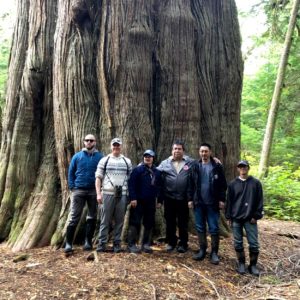Q&A with Coastal First Nations: Balancing Ecological Integrity and Human Well-being
 Thanks to a partnership with the Coastal First Nations-Great Bear Initiative (CFN-GBI), Tree Canada’s carbon offset program, Grow Clean Air, now offers carbon credits generated by the protection of old-growth trees in the Great Bear Rainforest.
Thanks to a partnership with the Coastal First Nations-Great Bear Initiative (CFN-GBI), Tree Canada’s carbon offset program, Grow Clean Air, now offers carbon credits generated by the protection of old-growth trees in the Great Bear Rainforest.
David Oxley, Business Corporations Manager for the CFN-GBI, tells us how the coastal alliance is working to revitalize a sustainable, conservation-based economy that will support member communities and future generations.
What is your coastal alliance’s connection with the rainforest and ocean?
Coastal First Nations-Great Bear Initiative is an alliance of First Nations along British Columbia’s North and Central Coast and Haida Gwaii—they include the Wuikinuxv, Heiltsuk, Kitasoo Xai’xais, Nuxalk, Gitga’at, Gitxaala, Metlakatla, Old Massett, Skidegate, and Council of the Haida Nation. Each Nation has its own distinct culture, governance and territory, but they are all within the Great Bear Rainforest—one of the largest temperate coastal rainforest systems left on Earth. First Nations have forged a rich culture here, with livelihoods deeply connected to the riches of rainforest and ocean.
What is unique about the CFN-GBI’s relationship with the provincial government?
In 2009, Coastal First Nations and the Province of British Columbia signed the Atmospheric Benefit Sharing Agreements, which give First Nations on the coast the ownership and right to sell carbon offsets in our territories. These agreements are the first of their kind in BC and the world. At more than 6 million hectares, the Great Bear Forest Carbon Project is the largest Indigenous-led, forest-based carbon offset project in Canada. Even more important, these offsets support long-term efforts of the Coastal Guardian Watchmen and other Indigenous stewards, who work to monitor and protect the region.
How does selling carbon credits support Coastal First Nations’ cultures and communities?
The sale of carbon credits provides CFN member Nations with revenue to support social development within our communities and sustainable economic initiatives, such as renewable energy projects, ecotourism and sustainable fisheries. The revenue has been used to create new stewardship positions, including management support for both marine and land-based protected areas that preserve wildlife species and biodiversity, as well as new roles with the Coastal Guardian Watchmen. The Coastal Guardians are viewed by other Indigenous Guardians across the country as an example to strive for, so supporting carbon offsets in the Great Bear Rainforest has an impact beyond CFN member Nations as well.
What future projects are you most excited about?
CFN member Nations are exploring opportunities to sequester carbon in the ocean (blue carbon), and actively researching some of the best methods and regions for carbon offsets from kelp farms. Our three-year Blue Carbon Quantification Methodology Project, funded by carbon offset sales, aims to provide a draft for a Blue Carbon protocol for BC and other areas with a similar climate.
How is CFN-GBI uniquely positioned to help fight climate change?
First, coastal temperate rainforests store enormous amounts of carbon per hectare—this includes the old-growth forests that people think of when considering the Great Bear Rainforest, but it also includes vast carbon-absorbing kelp forests as well. For thousands of years, our people have carefully managed the abundant resources here—ancient cedars, herring, salmon, halibut and much more—relying on our knowledge of seasonal cycles to harvest land and marine resources without depleting them. Our unique alliance is based on a shared commitment toward revitalizing a sustainable, conservation-based economy that will provide for our communities and all future generations.
What can Canadians learn from your journey so far?
We hope that our journey will help Canadians and others around the world learn that there is another way; that a true conservation-based economy is not only possible, but the only way forward. For other companies and organizations, carbon offsets provide an opportunity to demonstrate their commitment toward addressing their climate impact in a meaningful way. In the case of the Great Bear Forest Carbon Project, purchasers of high-quality carbon offsets support the protection of the world’s largest intact temperate rainforest and invest in a conservation economy that balances ecological integrity and human well-being.
Back to all articles